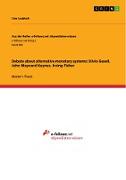Debate about alternative monetary systems: Silvio Gesell, John Maynard Keynes, Irving Fisher
BücherAngebote / Angebote:
Master's Thesis from the year 2013 in the subject Economics - Monetary theory and policy, grade: 1, 0, Berlin School of Economics and Law, course: International Finance, language: English, abstract: Due to the instability of current financial and monetary markets worldwide and the dysfunctions of current capitalism, this Master's thesis studies alternative monetary systems. The objective of this paper is to debate about historical as well as current alternative monetary systems and to evaluate their concept, theory and success.
First of all, the theoretical approaches to the problems of monetary systems of Silvio Gesell, John Maynard Keynes and Irving Fisher will be analyzed. Furthermore, a critical acclaim will be subjected by discussing the advantages and disadvantages of these reforms. Finally, the theories of the three economists will be compared in order to define similarities and differences. In the second main part, this thesis aims out exploring alternative monetary systems which have been implemented into practice. In the course of this analysis two historical case studies as well as seven current ones will be described and evaluated. The historical alternative monetary systems are based on Gesell's approach and the current systems represent complementary currency systems. The aim of this evaluation is to identify if alternative monetary systems can offer an added value for the economy and society. In the last chapter, this paper also aims out exploring if a global alternative monetary system could be established.
In conclusion, it can be said that all three economists developed alternative monetary systems which could have been very effective at that time. Nowadays, an adaptation of these systems is needed by changing them to complementary currencies instead of replacing the official currencies or by guaranteeing the preservation of national sovereignty e.g. In addition, complementary currency systems can be very successful by stimulating the local economy as well as strengthening the community. Furthermore, they are able to offer a monetary stability, sustainability and reduction of international inequalities. Nevertheless, they have to be managed well and there has to be a democratic decision on the amount of complementary currency that should be issued.
In summary, the introduction of complementary currency systems is recommended, because they are able to strengthen the economy as well as the community. If the economy is weak, these systems will have the potential to support the national currency by stimulating the local economy. Furthermore, these systems do not represent a high risk of financial failure due to low start-up costs.
Folgt in ca. 5 Arbeitstagen

